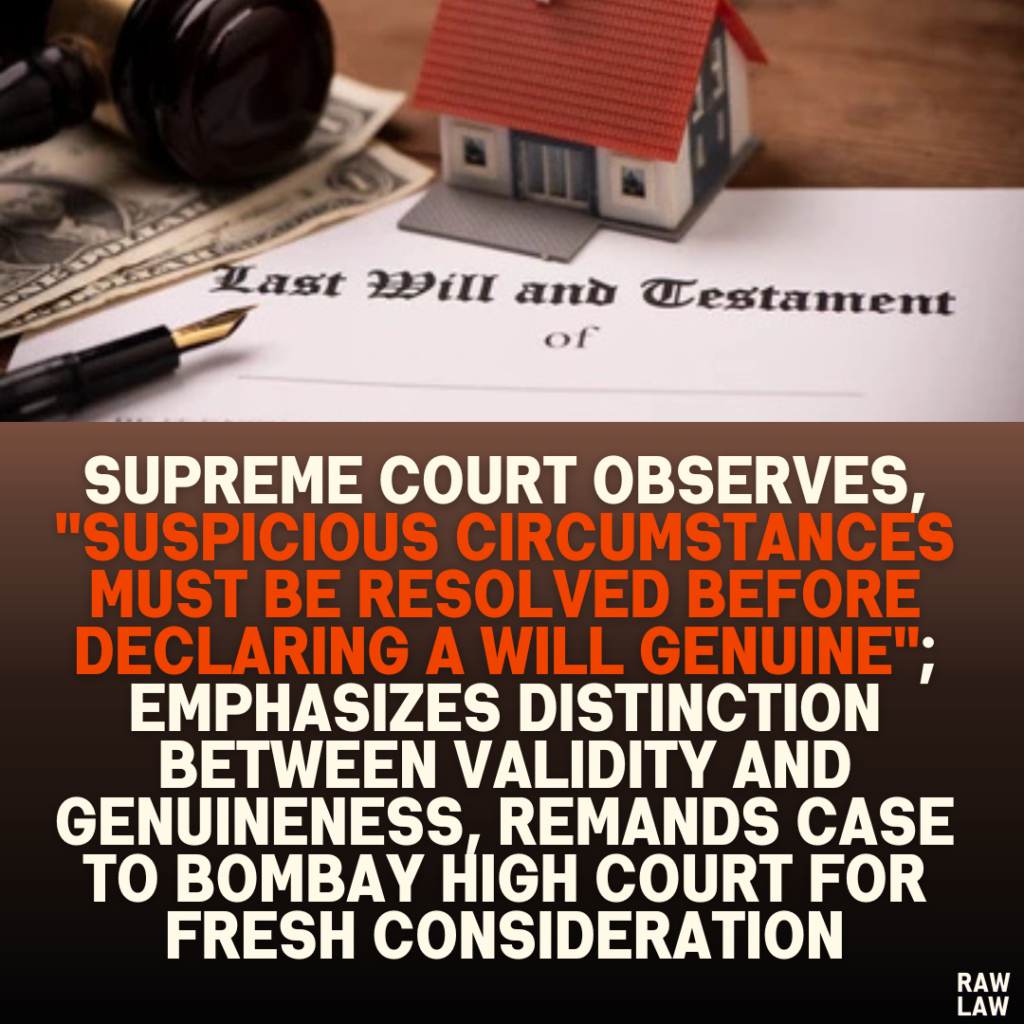Court’s Decision:
The Supreme Court of India allowed the appeal, setting aside the Division Bench’s judgment of the Bombay High Court, which had granted Letters of Administration (LoA) based on the disputed will. The Court emphasized that the genuineness of a will must be established only after addressing any suspicious circumstances. It remanded the case back to the High Court for a fresh evaluation, urging the court to resolve all legal and factual issues, including those raised regarding suspicious circumstances.
Facts:
- Dispute Over a Will: The case revolved around the will of Maria Francisca Coelho, who passed away in 1985. The respondent sought Letters of Administration (LoA) with the will annexed. The will, dated July 7, 1982, equally distributed the property among her three children.
- Challenges to the Will:
- The appellants questioned the will’s authenticity, alleging it was surrounded by suspicious circumstances.
- They contested the deceased’s testamentary capacity and suggested undue influence or fraud.
- Proceedings Before the High Court:
- A Single Judge of the Bombay High Court dismissed the suit, noting that although the will was validly executed, it was shrouded in suspicious circumstances that were not satisfactorily explained.
- On appeal, the Division Bench reversed this finding, declaring the will genuine and granting the respondent the requested LoA.
Issues:
- Whether the will was validly executed and attested as per the law.
- Whether the deceased possessed the requisite testamentary capacity at the time of the will’s execution.
- Whether the will was shrouded in suspicious circumstances that needed to be resolved.
- Whether the findings of the Single Judge could conclusively establish the will’s genuineness.
Petitioner’s Arguments:
- Faulty Conclusion by Division Bench:
- The appellants argued that the Division Bench erred in declaring the will genuine without addressing or resolving the suspicious circumstances identified by the Single Judge.
- They maintained that the findings on procedural validity were incorrectly equated with genuineness by the Division Bench.
- Mandatory Resolution of Suspicious Circumstances:
- The appellants contended that legal principles require courts to resolve any suspicious circumstances before concluding a will is genuine.
Respondent’s Arguments:
- Compliance with Legal Procedures:
- The respondent argued that the will was executed following the legal requirements outlined in the Indian Succession Act and the Indian Evidence Act.
- They claimed that the deceased was of sound mind and had the requisite testamentary capacity at the time of execution.
- Implied Genuineness:
- The respondent asserted that the Single Judge’s findings regarding the will’s procedural compliance implicitly established its genuineness.
Analysis of the Law:
- Distinction Between Validity and Genuineness:
- The Supreme Court highlighted that proving a will’s procedural compliance under Section 63 of the Indian Succession Act, 1925, and Section 68 of the Indian Evidence Act, 1872, only establishes its validity—not its genuineness.
- Suspicious circumstances must be independently resolved to determine genuineness.
- Requirement to Remove Doubts:
- Courts must ensure that suspicious circumstances surrounding a will are addressed and resolved before accepting it as genuine.
- Role of Precedents:
- In Moturu Nalini Kanth v. Gainedi Kaliprasad, the court held that a registered will’s validity must still be proved in accordance with the law.
- Similarly, in Derek A.C. Lobo v. Ulric M.A. Lobo, the court emphasized that even a validly executed will can be deemed non-genuine if surrounded by unresolved suspicious circumstances.
Precedent Analysis:
- Kavita Kanwar v. Pamela Mehta:
- It emphasized that the genuineness of a will cannot be presumed merely from its procedural validity.
- Derek A.C. Lobo v. Ulric M.A. Lobo:
- The court reiterated that suspicious circumstances must be resolved even if a will complies with statutory requirements.
- Moturu Nalini Kanth Case:
- The ruling clarified that registration alone does not ensure validity and that procedural and substantive conditions must be satisfied.
Court’s Reasoning:
- Findings of the Single Judge:
- The Single Judge ruled that the will was validly executed but had unresolved suspicious circumstances, which precluded the grant of LoA.
- These findings did not explicitly determine the genuineness of the will.
- Faulty Assumption by Division Bench:
- The Division Bench misinterpreted the Single Judge’s findings, treating procedural compliance as conclusive evidence of genuineness.
- It failed to examine whether suspicious circumstances were adequately resolved.
- Supreme Court’s Stance:
- The Supreme Court held that resolving suspicious circumstances is essential before a court can declare a will genuine.
- It found the Division Bench’s approach flawed and unsupported by precedent.
Conclusion:
The Supreme Court set aside the Division Bench judgment and remanded the case to the High Court for fresh consideration. It directed the High Court to comprehensively address all issues, including suspicious circumstances surrounding the will.
Implications:
This judgment underscores the necessity for courts to distinguish between procedural compliance and the genuineness of a will. It establishes that a validly executed will can still be questioned if unresolved suspicious circumstances exist, ensuring rigorous scrutiny in testamentary disputes. This approach safeguards against fraud and undue influence in estate matters.




Pingback: Patna High Court Directs Petitioner to Seek Administrative Remedy for Rectification of Clerical Error in Sale Deed, Emphasizing Exhaustion of Administrative Remedies Before Judicial Intervention - Raw Law